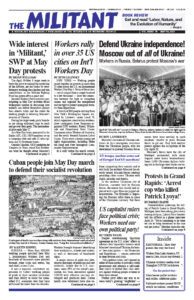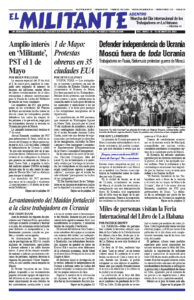May 19, 1997
HAVANA — Cubans poured into the streets leading to Revolution Plaza here on May Day. About 1.3 million demonstrated in Havana. Altogether, several million people turned out across the nation, in one of the largest mobilizations here in years.
It was the most visible rejection of U.S. imperialism’s attempts to divide working people from their revolutionary leadership and force the Cuban people to submit to Washington’s dictates through economic strangulation.
“Will the exploiters be able to return and take away our land, our homes, our factories, our hospitals, and our schools?” said Pedro Ross, general secretary of the Central Organization of Cuban Workers (CTC) in a brief speech. “Will we workers go back to being slaves, under the whip of the capitalist boss, to fill the pockets of a bourgeois minority with the product of our sweat?”
The cry of “No!” resonated through the vast square.
May 19, 1972
NEW YORK — “Women unite — abortion is our right!” This was the chant of 1,500 demonstrators, mostly young women, who marched here on May 6 against attacks by President Nixon and anti-abortion forces on the right to abortion in New York.
The demonstration was one of more than a dozen spirited actions nationwide called by the Women’s National Abortion Action Coalition around the demands of repeal of all anti-abortion and restrictive contraception laws and an end to forced sterilization.
WONAAC national coordinator Dr. Barbara Roberts stressed that “only a massive, independent women’s movement can save our sisters from butchery. Only by uniting in spite of our differences will we win for all women the right to choose.”
Actions around the country, although smaller, reflected the same enthusiasm and militancy as the New York demonstration.
May 17, 1947
The Spanish workers have dealt a stiff blow to Franco’s fascist regime. Work stoppages occurred throughout Spain on May Day. The Franco regime singled out the Basque workers of Bilbao for reprisals. For two days the workers had shut down tight the great steel mills, mines and shipyards.
Provincial Governor Riesta ordered mass arrests, but the strike remained solid. Then he decreed that workers who had participated were to lose seniority rights, suffer pay cuts and lose pension rights.
The strike spread to other Basque cities. Guipúzcoa province was the scene of sympathy strikes which closed munition, sewing machine and bicycle plants.
The N. Y. Times reports that, “Whatever penalties individuals may suffer, the workers in general have scored in a way that observers would not have believed possible in defiance of the iron-fisted Franco police system.”

